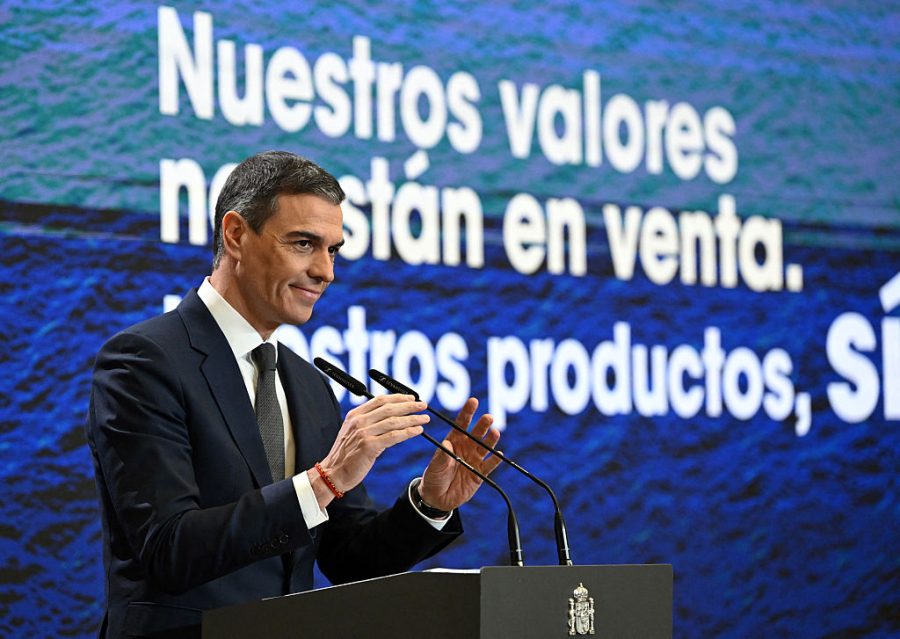At yesterday’s Nato summit in The Hague, all but one of the 32 leaders agreed to increase their defence spending to 5 per cent of GDP as President Trump has been demanding. The exception was Spanish Prime Minister Pedro Sánchez. His insistence that actually 2.1 per cent will be enough has enraged President Trump.
Trump described the Nato summit’s achievements as ‘tremendous’, celebrating its recognition of the need for other Nato members to take up the burden of the defence of Europe. He added that ‘it was 2 per cent [of GDP] and we’ve got it up to 5 per cent’. But he had harsh words for Spain, describing the country as ‘terrible’ and threatening to use trade tariffs ‘to make them [Spain] pay twice as much’.
Spain’s left-wing politicians seem delighted with Trump’s displeasure
This confrontation has been brewing for months. Ever since Trump’s re-election, Sánchez has been positioning himself as a leading opponent of the US President. Indeed Spain’s socialist prime minister and his supporters have repeatedly suggested that Trump’s victory in the US elections is confirmation of a sinister surge in global far-right extremism that embraces Brexit, Orban, Meloni, Wilders, Bolsonaro, Milei and is also increasingly evident in France and Germany.
For Sánchez it’s a dangerous, world-wide threat that he’s called upon to counter. He and his ministers seem to regard it as their mission to lead the struggle against an erosion of democracy and exultation of xenophobia of which, they say, Trump is the most powerful exponent. Presenting themselves as the heirs of the noble republicans who fought against General Franco in the civil war (1936-1939), Spain’s socialists feel that they are especially well-placed to understand and combat this ‘fascist threat’.
It’s a convenient conceit since it justifies Sánchez in clinging to power. Engulfed in corruption scandals, he’s under enormous pressure to call a general election. But Sánchez is insisting that, in fact, it is his duty to stay; after all, an election would almost certainly lead to a right-wing government which relied on the support of Vox – a right-wing party close to Trump which Sánchez and his followers describe as fascist.
Anti-American sentiment has deep roots in Spain. The 1953 Pact of Madrid, giving the US military bases in Spain, appeared to legitimise and consolidate Franco’s regime. The left, having harboured hopes that the US might one day help remove the dictator, felt betrayed. More recently, when he became prime minister in 2004, socialist José Luis Rodríguez Zapatero immediately withdrew troops from Iraq, incurring President Bush’s wrath and earning Spain a reputation as an unreliable ally but boosting his popularity and pacifist credentials at home.
The country has also always been divided over membership of Nato. When Spain joined in 1982, the socialists took to the streets with banners reading ‘No to Nato’. Later, when they came to power, they changed their mind as they experienced what Prime Minister Felipe González called ‘a brutal process of adaptation to reality’.
González had already promised a referendum on Nato membership, however. With only 19 per cent of Spaniards in favour of membership, it was no easy task for him to get a majority to reaffirm Spain’s membership in the referendum held in 1986. But shameless exploitation of state media, including his final, passionate plea to the nation the evening before the vote, eventually ensured a narrow majority of 52 per cent in favour of staying in Nato.
Discontent with Nato and the defence spending that membership entails is never far away, however. In April, when Prime Minister Sánchez promised to increase Spain’s defence budget from 1.3 to 2 per cent of GDP, the radical left-wing and separatist parties that are propping up his fragile minority coalition government immediately accused him of war-mongering.
Now Spain’s left-wing politicians seem delighted with Trump’s displeasure. One immediately announced that ‘it’s always been a good thing to piss off a neoliberal fascist’. Another said that Spain’s refusal to pay 5 per cent proved that it was not a ‘vassal state’. A third called for Spain to leave Nato, which she described as ‘a criminal and terrorist organisation’. It remains to be seen how the Spanish people will react to Trump’s threats to punish them with tariffs.







Comments